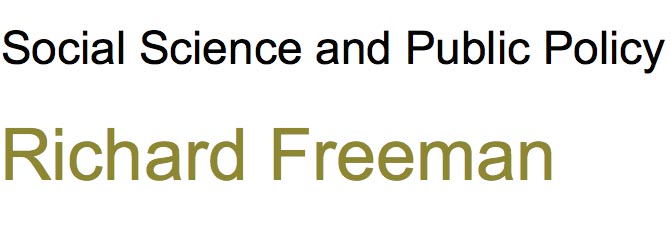2007 | journal paper
How do policy makers come to know what they know? How do they think of learning? And how does that inform what they do? In this qualitative, empirical study, public health officials variously display scientific, institutional, and more socially situated epistemological strategies or rationalities.
2007 | former doctoral students
is a former consultant who developed the concept of gender knowledge to account for different patterns of gender mainstreaming in Europe. She was a visiting scholar at Humboldt University, Berlin, a Marie Curie Fellow at Radboud University, Nijmegen, and is now...
2007 | chapter in book
Health policy is as modern as social democracy. This is not to suggest that social democracy is some sort of ’cause’ of health policy, but that their environments – political, economic, demographic, social and ideological – are shared. Underpinning all of these is a common, modern epistemology, which frames the causes and effects of social problems and the capacities of government in specific ways.
2006 | journal paper
At the center of the politics of health equity, in many countries and circumstances, stands a signal report of research. This article is concerned with what might be described as the architecture of such documents, including how they are produced and organized and the relationships they demonstrate with others that parallel, precede, and succeed them.
2005 | former doctoral students
as Scientific Officer at the European Centre for Disease Prevention and Control (ECDC), was researching the international governance of infectious disease.
2005 | journal paper, Marmor T : Freeman R : Okma K (eds)
The main point of this article is to explore the methodological questions raised by weaknesses in international comparative work in the field of health policy. The core question is how competent learning from one nation to another can take place.
2005 | Freeman R : Marmor T R, journal paper
Source: Journal of Health Services Research and Policy 8 (3) 180-182 link SaveSave
2005 | chapter in book
Relationships between states and citizens are defined at least in part through respective obligations and entitlements to welfare. Harold Lasswell’s ‘Who gets what, when, how’ is as good a definition of welfare as of politics: welfare is both source and target of a high proportion of political conflict in advanced industrial societies.
2004 | former doctoral students
wrote about Democratic Party workers in Boston, and is now Senior Director of Research and Development at the American Political Science Association.
2002 | journal paper
The computerization of the medical record has important implications for the governance of health care, and the importance of health care means that changes wrought there are indicative of changes in government as a whole.
2002 | former doctoral students
completed her PhD on communication patterns and the domestication of information technology in general practice while working at the Audit Commission in London.
2000 | former doctoral students
worked on gender mainstreaming and the Scottish Executive and is now working at the Home Office in London.
